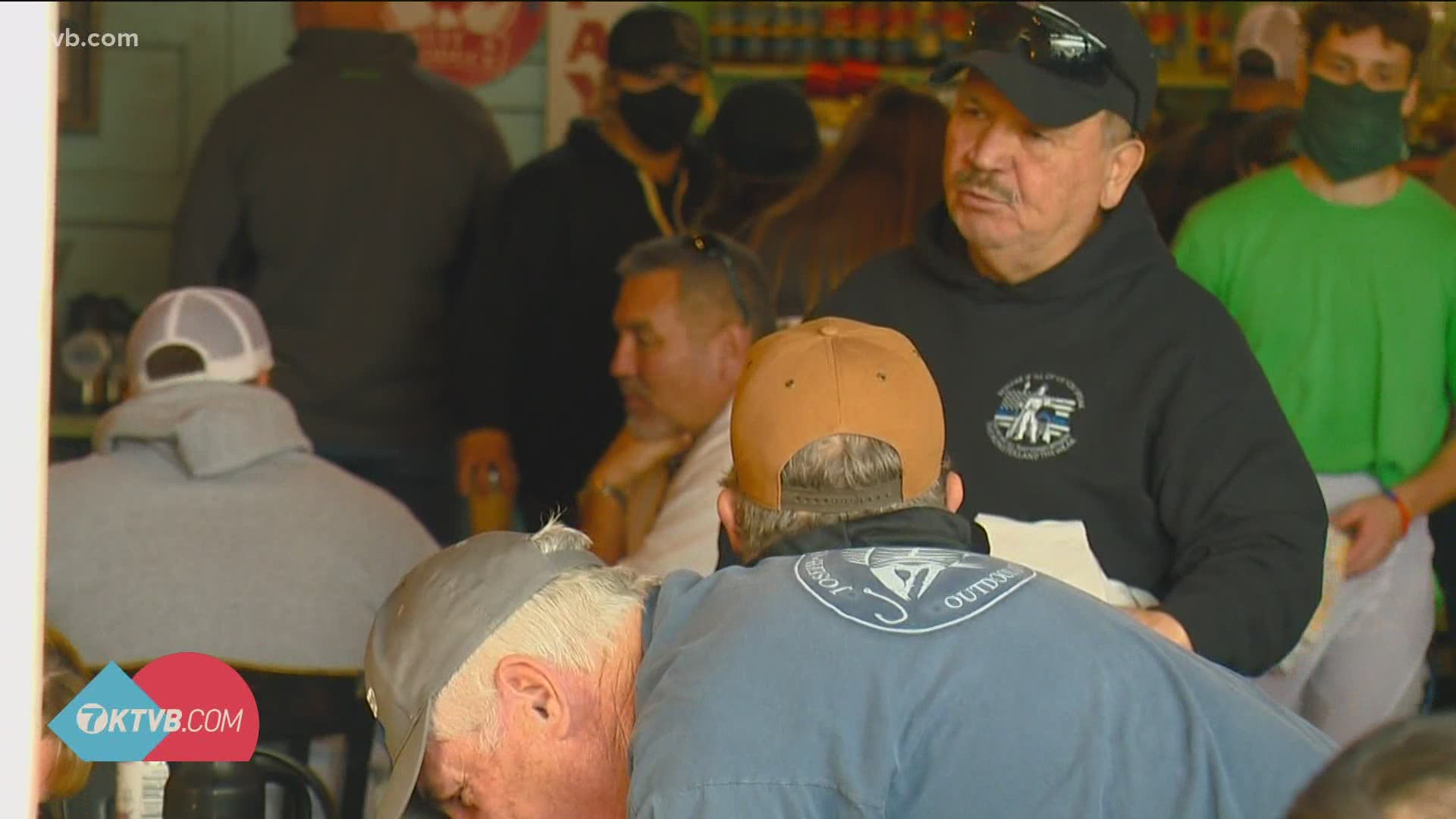BOISE, Idaho — Editor's note: The video above first aired on October 30, 2020.
The owner of Big City Coffee is suing Boise State University and several university officials for at least $10 million, claiming the business was forced off campus because of controversy over her support for law enforcement and display of a "Thin Blue Line" emblem at another Big City location.
In a 31-page complaint filed in Fourth District court, Big City Coffee, LLC, and owner Sarah Jo Fendley allege that university officials violated Big City's rights under the U.S and Idaho constitutions to freedom of speech, due process of law and equal protection under the law. The suit also accuses the university of violating the Idaho Consumer Protection Act, committing fraud by omission, and "knowingly, wrongly and intentionally" interfering with a contract awarded to Big City in May 2020, when Big City was selected from among several Boise coffee shops after the university opted to replace Starbucks with a local business in the Albertsons Library.
The Boise State University officials named in the lawsuit are President Dr. Marlene Tromp, Vice President for Student Affairs and Enrollment Management Leslie Webb, Vice President for University Affairs and Chief of Staff Alicia Estey, and Francisco Salinas, who is assistant to the vice president for equity initiatives. The complaint also mentions "DOES 1-20," referring to defendants not yet named, as the plaintiffs are "unaware of the true names, identities or capacities" of those defendants.
Big City has operated a coffee shop and cafe for more than a decade on Grove Street, in downtown Boise's Linen District. Fendley began displaying the Thin Blue Line emblem at that location in 2016, after the ambush in which five police officers were murdered in Dallas, Texas.
In its complaint, Big City mentions that Jeremy Harper, a Boise State faculty member and director of a group called Boise State Uniting for Inclusion and Leadership in Diversity, "took umbrage" with the Blue Line flags and, in social media posts, called for a boycott of Big City.
The Thin Blue Line flag is viewed by some critics as a direct response to the Black Lives Matter movement. In one of his posts, according to the complaint, Harper wrote that "flying them is either a sign of ignorance about the realities of systemic racism that are well documented in our police and prison systems or a complete disregard for the harm that racism causes to Black people and communities across the country… it reinforces the white supremacist belief that police are above criticism…”
The complaint against Boise State states that Fendley did not intend her support of Thin Blue Line to be an attack on Black Lives Matter or any racial minority, but rather a way to honor police officers injured or killed in the line of duty.
Between May and September 2020, when Big City opened its on-campus shop, Boise State representatives and Fendley were in regular contact. During that period, the complaint says, university officials did not give Fendley any indication that there was a growing controversy related to her support of law enforcement and her engagement to Kevin Holtry, a Boise Police officer who was paralyzed and lost a leg after he was shot in the line of duty in 2016. The suit claims Fendley later found out that the officials named in the complaint had "ample notice" that activists, described in the complaint as "radical elements," were aware that Big City was coming to BSU, and that the Inclusive Excellence Student Council (IESC) objected to Big City's presence on campus due to Pendley's law enforcement connection.
"In fact, the IESC reflects and embodies Defendants’ social justice agenda," the complaint says. "This agenda is promoted and fostered by BSU and pervades the campus and curriculum. Salinas and Webb, the latter of whom at all times relevant hereto reported directly to President Tromp, regularly attended IESC meetings and lent their support to the group’s actions."
The complaint makes several references to left-leaning bias at Boise State and the controversy over claims of "social justice indoctrination."
The complaint states that the Boise State administration treated Big City differently than other vendors because of Fendley's expression, and took several adverse actions against Big City, including "forcing the termination of the contract; declining to support or defend Big City against a defamatory attack by a vocal minority claiming that plaintiffs were racists and support racism; not informing plaintiffs of the campus 'firestorm' prior to signing the contract; forcing plaintiffs to close their campus location and/or manufacturing a situation where Big City would have no choice but to leave BSU; and creating a hostile environment for plaintiffs on the BSU campus."
The section of the complaint accusing Boise State of "fraud by omission" states that, based on incomplete information from university administrators, Big City borrowed money and dedicated time and resources to establish its on-campus location, including hiring students as employees, while foregoing other business opportunities.
Big City Coffee and Fendley are being represented by Michael O. Roe, Alexander P. McLaughlin and Lars E. Lundberg, who are with the Givens Pursley law firm in Boise.
Boise State officials have not commented on the lawsuit, they've said Big City chose to leave. After Big City closed its on-campus shop on October 30, 2020, they issued a statement saying that "at no time did the administration at Boise State ask Big City Coffee to leave campus. At no time did the administration ask Big City Coffee to compromise the owner’s First Amendment rights."
In addition to a judgment of at least $10 million, Big City wants the court to issue a statement declaring that Boise State violated Big City's and Fendley's constitutional rights. Big City is also seeking $25,000 for attorney fees and court costs.
A hearing has not yet been set in this case.
Watch more Local News:
See the latest news from around the Treasure Valley and the Gem State in our YouTube playlist:

